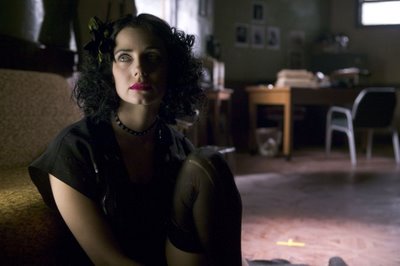 Grindhouse – dir. Robert Rodriguez, Quentin Tarantino, Rob Zombie, Edgar Wright, Eli Roth
Grindhouse – dir. Robert Rodriguez, Quentin Tarantino, Rob Zombie, Edgar Wright, Eli RothProbably the most rousingly effective ode to bad taste that graced the cinemas over the past ten years, Grindhouse provided its audience what so few of the exploitation films it honors only hinted toward: the meat (and outside of Antichrist, my Decade List entries have been a little too “respectable” lately). With both the meat and the sizzle on the plate, Robert Rodriguez and Quentin Tarantino (as well as Rob Zombie, Edgar Wright and Eli Roth who directed shorts that accompanied the double-feature) recreated the spirit of the films they both love so much with their back-to-back sleaze fests, Planet Terror and Death Proof, both of which just so happen to be two of the best films either director has ever made. The former is the best thing Rodriguez has ever done; with Tarantino, it’s not as certain.
 As its intended theatrical double-feature, both Planet Terror and Death Proof hilariously play off one another, despite aligning with different subsets of exploitation films. Planet Terror is blissful mayhem from the Rose McGowan go-go dancing credit sequence to its absurd (in the good way), utopian ending. Death Proof, however, takes its time, alienating certain viewers with its incessant long-take dialogue and Tarantino pop culture references. Yet, however you feel about the rest of the film, Death Proof offers the most exhilarating finale for not just the Tarantino entry, but Grindhouse itself. The positioning of the films is almost as crucial as the films themselves, not to mention that both sort of play off one another. In Planet Terror, we hear a radio dedication to one of the characters in Death Proof, not to mention that McGowan appears in both films as drastically different characters and Marley Shelton as the same one. And in a way, Grindhouse is just as much an ode to the specific charms of Rose McGowan as it is grindhouse films of the past.
As its intended theatrical double-feature, both Planet Terror and Death Proof hilariously play off one another, despite aligning with different subsets of exploitation films. Planet Terror is blissful mayhem from the Rose McGowan go-go dancing credit sequence to its absurd (in the good way), utopian ending. Death Proof, however, takes its time, alienating certain viewers with its incessant long-take dialogue and Tarantino pop culture references. Yet, however you feel about the rest of the film, Death Proof offers the most exhilarating finale for not just the Tarantino entry, but Grindhouse itself. The positioning of the films is almost as crucial as the films themselves, not to mention that both sort of play off one another. In Planet Terror, we hear a radio dedication to one of the characters in Death Proof, not to mention that McGowan appears in both films as drastically different characters and Marley Shelton as the same one. And in a way, Grindhouse is just as much an ode to the specific charms of Rose McGowan as it is grindhouse films of the past. While I generally lean toward Death Proof as the superior of the two, I suppose it really boils down to a matter of (dis)taste. Planet Terror is about as faithful as you can get to a zombie-infused nuclear apocalypse film. The script, by Rodriguez, would have probably been ranked as one of the more efficient and skilled (in a screenwriting sense) of the time, had it came out during said period. Everything obnoxiously and hilariously comes back in the end, from corny life lessons to disputes among characters, one in particular involving a barbeque recipe. The screenplay is so artless that it reaches a level of tongue-in-cheek beauty.
While I generally lean toward Death Proof as the superior of the two, I suppose it really boils down to a matter of (dis)taste. Planet Terror is about as faithful as you can get to a zombie-infused nuclear apocalypse film. The script, by Rodriguez, would have probably been ranked as one of the more efficient and skilled (in a screenwriting sense) of the time, had it came out during said period. Everything obnoxiously and hilariously comes back in the end, from corny life lessons to disputes among characters, one in particular involving a barbeque recipe. The screenplay is so artless that it reaches a level of tongue-in-cheek beauty. Death Proof, however, functions drastically differently. I, personally, haven’t felt like Quentin Tarantino has ever really followed up Pulp Fiction; the tepid Jackie Brown and overrated Kill Bill series don’t feel like films as much as they do time-wasters, even though time wasting is what Tarantino does best in Death Proof. In hindsight, one realizes that Death Proof only exists for its final fifteen-minutes, its utterly invigorating car chase. Once again, I’d like to quote my friend Tom, who hilariously described James Gray’s We Own the Night as “a car chase in search of a movie;” that particular statement would perfectly describe Death Proof, only in this case its not a criticism. While some might disagree with it not being a criticism, the chattiness in Death Proof isn’t merely a Tarantino motif as it is intentionally unintentional suspense. There’s an overcast of fear and terror that runs throughout the film which heightens with every silly talk-fest that is seemingly just leading up to the film’s stunning climax. When the film reaches its second act (Death Proof itself is something a double bill), there’s a real uneasiness about what is about to transpire. The excessive build-up to the game of ship’s mast that stuntwoman Zoë Bell and Tracie Thoms want to play is both irritating and alarming. Their chatter, which just fills screen time to the act itself, makes for brilliant danger, which Tarantino will execute like, really, no other in the scene that follows. I appreciate the long stretches of dialogue that seem to be about nothing, because it feels like an authentic exploitation film that wrote some semblance of a screenplay around a single jolting car chase sequence. Pop culture references from Lindsay Lohan to Vanishing Point (and the best of the lot, when Rosario Dawson tells her girlfriends that her director boyfriend fucked Daryl Hannah’s stand-in) become permissible not because Death Proof is so good but because modesty doesn’t really have any place here.
Death Proof, however, functions drastically differently. I, personally, haven’t felt like Quentin Tarantino has ever really followed up Pulp Fiction; the tepid Jackie Brown and overrated Kill Bill series don’t feel like films as much as they do time-wasters, even though time wasting is what Tarantino does best in Death Proof. In hindsight, one realizes that Death Proof only exists for its final fifteen-minutes, its utterly invigorating car chase. Once again, I’d like to quote my friend Tom, who hilariously described James Gray’s We Own the Night as “a car chase in search of a movie;” that particular statement would perfectly describe Death Proof, only in this case its not a criticism. While some might disagree with it not being a criticism, the chattiness in Death Proof isn’t merely a Tarantino motif as it is intentionally unintentional suspense. There’s an overcast of fear and terror that runs throughout the film which heightens with every silly talk-fest that is seemingly just leading up to the film’s stunning climax. When the film reaches its second act (Death Proof itself is something a double bill), there’s a real uneasiness about what is about to transpire. The excessive build-up to the game of ship’s mast that stuntwoman Zoë Bell and Tracie Thoms want to play is both irritating and alarming. Their chatter, which just fills screen time to the act itself, makes for brilliant danger, which Tarantino will execute like, really, no other in the scene that follows. I appreciate the long stretches of dialogue that seem to be about nothing, because it feels like an authentic exploitation film that wrote some semblance of a screenplay around a single jolting car chase sequence. Pop culture references from Lindsay Lohan to Vanishing Point (and the best of the lot, when Rosario Dawson tells her girlfriends that her director boyfriend fucked Daryl Hannah’s stand-in) become permissible not because Death Proof is so good but because modesty doesn’t really have any place here. I mentioned in the piece on Children of Men that I pity those who missed it in the theatre, as the home theatre experience could never fully recreate the cinema experience, and this statement applies just as much to Grindhouse (and it would even if The Weinstein Company had released Grindhouse officially on DVD instead as two separate films). I don’t mean to suggest that the best cinematic experiences come in the form of bold “action flicks;” I still regret that I had to see the majestic Flight of the Red Balloon on television and not in the theatre (and I also defended the theatre-going experience with Mulholland Drive as well). But anyway, I can’t really think of another theatrical experience I had in the past 10 years that was more entertaining to the point of beatific exhaustion than Grindhouse.
I mentioned in the piece on Children of Men that I pity those who missed it in the theatre, as the home theatre experience could never fully recreate the cinema experience, and this statement applies just as much to Grindhouse (and it would even if The Weinstein Company had released Grindhouse officially on DVD instead as two separate films). I don’t mean to suggest that the best cinematic experiences come in the form of bold “action flicks;” I still regret that I had to see the majestic Flight of the Red Balloon on television and not in the theatre (and I also defended the theatre-going experience with Mulholland Drive as well). But anyway, I can’t really think of another theatrical experience I had in the past 10 years that was more entertaining to the point of beatific exhaustion than Grindhouse. With: Rose McGowan, Kurt Russell, Marley Shelton, Zoë Bell, Rosario Dawson, Tracie Thoms, Freddy Rodriguez, Josh Brolin, Sydney Tamiia Portier, Vanessa Ferlito, Jeff Fahey, Michael Biehn, Jordan Ladd, Naveen Andrews, Bruce Willis, Quentin Tarantino, Mary Elizabeth Winstead, Eli Roth, Rebel Rodriguez, Tom Savini, Omar Doom, Michael Parks, Electra Avellán, Elise Avellán, Stacy Ferguson, Marcy Harriell, James Parks, Jay Hernandez, Udo Kier, Sheri Moon Zombie, Nicolas Cage, Sybil Danning, Tom Towles, Bill Moseley, Simon Pegg, Nick Frost, Katie Melua, Matthew Macfadyen, Danny Trejo, Cheech Marin, Will Arnett
With: Rose McGowan, Kurt Russell, Marley Shelton, Zoë Bell, Rosario Dawson, Tracie Thoms, Freddy Rodriguez, Josh Brolin, Sydney Tamiia Portier, Vanessa Ferlito, Jeff Fahey, Michael Biehn, Jordan Ladd, Naveen Andrews, Bruce Willis, Quentin Tarantino, Mary Elizabeth Winstead, Eli Roth, Rebel Rodriguez, Tom Savini, Omar Doom, Michael Parks, Electra Avellán, Elise Avellán, Stacy Ferguson, Marcy Harriell, James Parks, Jay Hernandez, Udo Kier, Sheri Moon Zombie, Nicolas Cage, Sybil Danning, Tom Towles, Bill Moseley, Simon Pegg, Nick Frost, Katie Melua, Matthew Macfadyen, Danny Trejo, Cheech Marin, Will ArnettScreenplay: Robert Rodriguez, Quentin Tarantino, Rob Zombie, Edgar Wright, Jeff Rendell, Eli Roth
Cinematography: Robert Rodriguez, Quentin Tarantino, Phil Parmet, Milan Chadima
Music: Graeme Revell, Robert Rodriguez, Carl Thiel, Tyler Bates, David Arnold, Nathan Barr
Country of Origin: USA
US Distributor: Dimension/The Weinstein Company
Premiere: 6 April 2007















